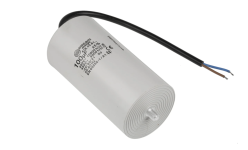I bought years ago and was sold as a motor capacitor.
- it's rated 100uF 450VAC 5%.
- it's labeled CBB65.
- it's encased in metal (aluminum?).
- it's a huge cylinder. 50mm by 125mm. it looks similar to the ASC 300uf (but smaller) I bought long time ago.
https://www.capacitorindustries.com...b65r-motor-run-capacitors-single-capacitance/
Google is your friend. MKP
Google is your friend. MKP
I only asked because I saw a reply here that says motor run (not motor start) is the one to use for audio.Mostly all capacitors as you describe, motor start/run, are polypropylene.
Aluminium can, some are thread mounted, newer are mounted in plastic.
Very reliable and self healing to a certain extent.
Why would anyone want to use a high voltage large component for low voltage audio use.
If used as a crossover, they are a bit outdated as most bi amped speakers use a dual amplifier with a controlled electronic crossover.
Seems bazzar.
If used as a crossover, they are a bit outdated as most bi amped speakers use a dual amplifier with a controlled electronic crossover.
Seems bazzar.
CBB is Chinese for MKP, metallized polypropylene film,
... most of the time 🙂
If you want to be sure, throw it in the freezer, and measure the capacitance before/after: true MKP has a negative temperature coefficient, i.e. the capacitance goes up when the temperature goes down. Polyester (MKT) is the opposite.

... most of the time 🙂
If you want to be sure, throw it in the freezer, and measure the capacitance before/after: true MKP has a negative temperature coefficient, i.e. the capacitance goes up when the temperature goes down. Polyester (MKT) is the opposite.
Not sure how you know what my setup is since I never mentioned it (PS your assumptions are wrong)Why would anyone want to use a high voltage large component for low voltage audio use.
If used as a crossover, they are a bit outdated as most bi amped speakers use a dual amplifier with a controlled electronic crossover.
Seems bazzar.
Thanks for the tip. Let me try thatCBB is Chinese for MKP, metallized polypropylene film,
... most of the time 🙂
If you want to be sure, throw it in the freezer, and measure the capacitance before/after: true MKP has a negative temperature coefficient, i.e. the capacitance goes up when the temperature goes down. Polyester (MKT) is the opposite.
@Zung
Tried your suggestion last night (5-6 hours in the freezer) and the capacitance hardly change.
If I have to guess, the change is less than 0.5-0.75uF which I think is not enough to definitively conclude that the capacitor is MKP or not?
In saying that, I'll try again but this time I'll freeze it longer.
Tried your suggestion last night (5-6 hours in the freezer) and the capacitance hardly change.
If I have to guess, the change is less than 0.5-0.75uF which I think is not enough to definitively conclude that the capacitor is MKP or not?
In saying that, I'll try again but this time I'll freeze it longer.
Yes, you can read it on the graph: between +20°C and -20°C, the change is about 1%.
As long as the capacitance goes UP in the freezer, it's MKP.
Alternatively, if you're brave, set your oven to 80°C, and your cap should go down by 1.5%. It'll live, btw.
And yes, you can combine freezer and oven if your cap meter is really crappy.
As long as the capacitance goes UP in the freezer, it's MKP.
Alternatively, if you're brave, set your oven to 80°C, and your cap should go down by 1.5%. It'll live, btw.
And yes, you can combine freezer and oven if your cap meter is really crappy.
I use an 80 ºC oven for drying PCBs after washing the flux off. No bravery needed. If you're worried about the radiant heat from the heater element ruining the capacitor, just preheat the oven to 80 ºC for 10-15 minutes, put the capacitor in the oven, and turn the oven off. It'll retain its heat for longer than the few minutes it takes to heat up the capacitor.
Tom
Tom
- Home
- Design & Build
- Parts
- Motor capacitor: could this be polypropylene?
